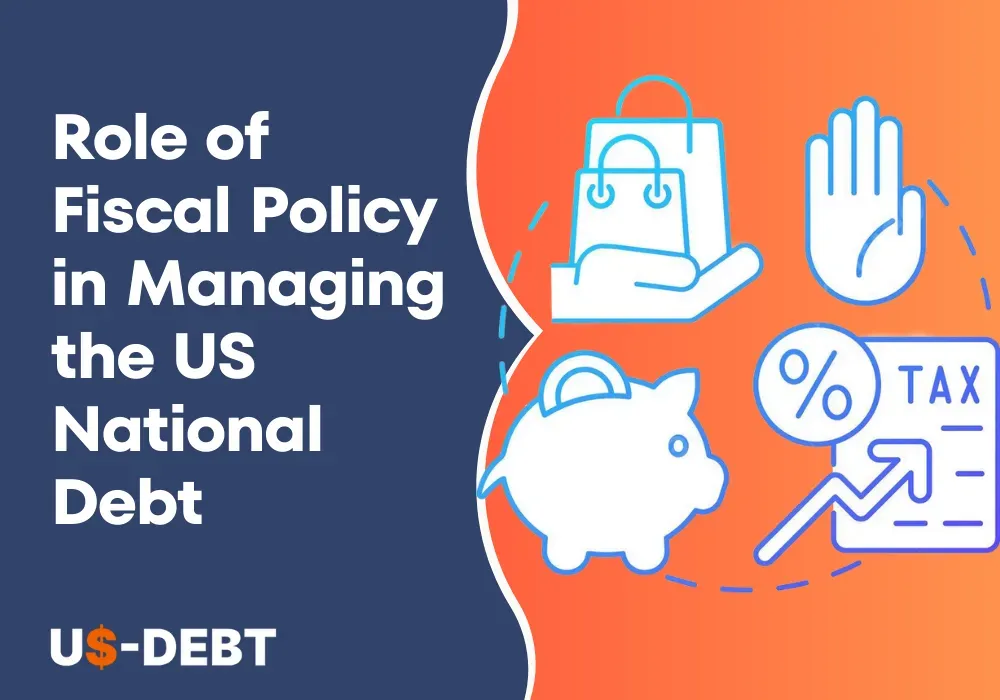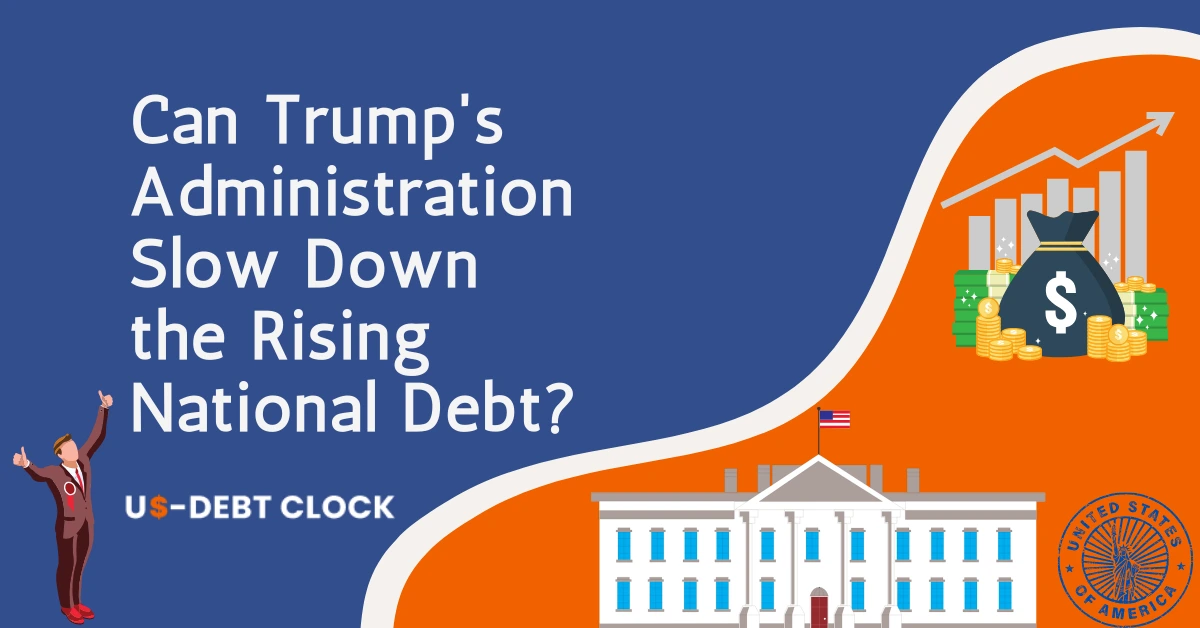The US national debt has been a subject of discussion and distress for several decades. Comprehending the role of fiscal policy in discoursing this economic crisis is crucial as long as the debt keeps on increasing. This blog seeks to explain the importance of fiscal policy in tackling the US national debt and to examine the methods, constraints, and possible results of its application.
Â
Understanding Fiscal Policy
The economic environment of a nation is significantly influenced by fiscal policies. It refers to the government's use of taxation and public expenditure to influence the overall economy. This powerful tool aims to achieve specific objectives and promote economic stability and growth.
Â
Definition and Objectives of Fiscal Policy
Fiscal policy involves the government's decisions regarding taxation and spending. Its primary objective is to manage the overall economy by influencing aggregate demand, employment levels, and price stability. The government hopes to ensure economic stability, encourage sustainable growth, lessen income inequality, and solve important macroeconomic concerns through fiscal policy.
Â
Tools of Fiscal Policy
Fiscal policy employs various tools to achieve its objectives. These tools include taxation, government spending, and budgetary allocations. Taxation enables the government to raise revenue, regulate income distribution, and influence consumer behavior. Government spending involves the allocation of funds for infrastructure development, social programs, and public services. By adjusting taxation and spending levels, fiscal policy can stimulate or cool down the economy as needed.
Â
Role of Government in Implementing Fiscal Policy
The government plays a central role in implementing fiscal policy. It formulates and implements policies through legislative measures, budget planning, and decision-making processes. Government agencies, such as finance ministries and treasury departments, oversee the execution of fiscal policy. The government is in charge of deciding on tax rates, making budgets, distributing money, and making sure that resources are used effectively. Additionally, the government monitors and evaluates the outcomes of fiscal policy to make informed adjustments and improvements.
Â
Role of Fiscal Policy in Managing the National Debt
A nation's national debt is managed in large part by its fiscal strategy. The national debt refers to the accumulated borrowing by the government to finance its expenditures over time. The issues brought on by the rising national debt may be addressed with effective fiscal policy, which can also guarantee long-term economic stability.
Â
Debt Reduction Strategies
Â
Revenue Generation: Fiscal policy can be utilized to generate additional revenue through various means, such as increasing tax rates, broadening the tax base, and closing tax loopholes. By increasing government revenue, the debt can be gradually reduced.
Government Spending Adjustments: By implementing prudent spending decisions, fiscal policy can contribute to debt reduction. This may involve reducing unnecessary expenditures, streamlining government programs, and implementing cost-saving measures.
Economic Growth Stimulation: Fiscal policy measures, such as infrastructure investments, tax incentives, and business-friendly policies, can stimulate economic growth. A robust economy generates higher tax revenue, reducing the debt burden over time.
Â
Impact of Fiscal Policy on the National Debt
Fiscal policy has a direct influence on the national debt. Expansionary fiscal policies, involving increased government spending and reduced taxes, can contribute to a higher debt level. Conversely, contractionary fiscal policies, involving reduced government spending and increased taxes, can help mitigate the growth of the national debt.
Â
Examples of Fiscal Policy Measures Aimed At Managing The National Debt
Several countries have implemented fiscal policy measures to effectively manage their national debt. For instance, to lower debt levels, several governments have implemented fiscal consolidation plans that include expenditure reductions and revenue-raising strategies. To stop the long-term debt rise, other nations have concentrated on fundamental changes including pension and healthcare reforms. Additionally, fiscal rules and targets have been implemented to ensure responsible fiscal management and debt sustainability.
Â
Criticisms and Limitations of Fiscal Policy in Debt Management
Although fiscal policy is a strong instrument for controlling the national debt, it is not without flaws and restrictions. Understanding these challenges is essential for policymakers to navigate the complexities of debt management effectively.
Â
Ineffectiveness of Fiscal Policy in Certain Economic Conditions
Fiscal policy may prove ineffective in certain economic conditions. For instance, during downturns or recessions, conventional fiscal policy measures, such as tax cuts or increased government spending, may have a limited impact on promoting economic development or lowering debt. This is because households and businesses may opt to save rather than spend, resulting in reduced multiplier effects.
Â
Political Challenges and Policy Implementation Issues
Fiscal policy decisions can be influenced by political considerations, directing to suboptimal outcomes. Political pressures may hinder timely and decisive action in addressing the national debt. Disagreements among policymakers and vested interests can impede the implementation of effective fiscal measures, delaying debt reduction efforts.
Â
Potential Negative Consequences of Certain Fiscal Policy Measures
Some fiscal policy measures aimed at managing the national debt may have unintended negative consequences. For example, excessive austerity measures, such as drastic spending cuts, can hinder economic growth and exacerbate unemployment. Similarly, rapid tax increases may discourage investment and consumer spending, further impacting economic growth.
Debt management is further complicated by the interaction of fiscal policy with other economic variables such as monetary policy, external shocks, and global economic circumstances. Coordinating and aligning fiscal policy with other policy tools becomes crucial to achieve desired outcomes.
Â
Case Studies and Success Stories
Examining case studies of countries that have effectively managed their national debt through fiscal policy can provide valuable insights and lessons for addressing the US national debt situation.
Â
Countries Effectively Managing Their National Debt through Fiscal Policy
Several countries have successfully implemented fiscal policy measures to manage their national debt. For instance, cautious planning, expenditure restrictions, and measures to increase income led to a large decrease in Canada's debt-to-GDP ratio. Sweden executed a thorough fiscal consolidation program in the 1990s that included spending cutbacks and tax changes and led to a major decline in the country's debt levels.
Â
Lessons Learned From Successful Debt Management Strategies
From these success stories, several lessons emerge. First, a multi-faceted approach combining expenditure control, revenue generation, and structural reforms is essential. Second, a long-term perspective and commitment to fiscal discipline are crucial. Third, involving stakeholders and maintaining transparency in decision-making fosters public trust and support. Additionally, countries that prioritize sustainable economic growth alongside debt reduction tend to achieve better outcomes.
Â
Relevance of These Case Studies to the US National Debt Situation
These case studies hold relevance for the US national debt situation. While every country's circumstances are unique, the principles and strategies employed by successful debt managers can inform US policymakers. Learning from these experiences can guide the development of comprehensive fiscal policy measures, including prudent spending decisions, revenue enhancement, and structural reforms, to address the US national debt. By comprehending the benefits of long-term responsibility, stakeholder involvement, and a balanced method of debt reduction and economic growth, it is feasible to identify effective solutions for handling the US national debt.
Â
Future Outlook and Recommendations
Â
Long-Term Importance of the National Debt on the Economy
The national debt has substantial long-term economic consequences. Increased borrowing costs, less fiscal flexibility, and lowered investor confidence can all result from having a large burden of debt. It may crowd out private investment, hinder economic growth, and limit resources for crucial government programs. Moreover, the servicing of a large debt can divert funds from investments in education, infrastructure, and innovation, impacting long-term productivity and competitiveness.
Â
Potential Fiscal Policy Reforms to Improve Debt Management
To address the national debt, policymakers can consider several fiscal policy reforms. First, implementing a comprehensive and sustainable fiscal consolidation plan can gradually reduce the debt burden. This may involve a combination of revenue enhancements, expenditure control, and structural reforms to improve efficiency and effectiveness. Second, implementing fiscal rules and targets can promote responsible fiscal management and debt sustainability. Third, enhancing transparency and accountability in fiscal policy decisions can build public trust and support.
Â
Collaboration between Fiscal and Monetary Policy for Better Outcomes
Collaboration between fiscal and monetary policy is crucial for managing the national debt effectively. Coordinating fiscal policy with monetary policy, implemented by central banks, can lead to better outcomes. Clear communication and coordination between these two policy areas can help balance debt reduction with economic growth and price stability. Additionally, coordination can help manage interest rates, inflation, and exchange rates in a manner that supports debt sustainability and economic stability.
Â
Conclusion
In conclusion, it is impossible to overvalue the significance of fiscal policy in controlling the US national debt. The government can solve the debt problem, promote economic expansion, and guarantee long-term stability by implementing sensible fiscal policies. However, it is crucial to strike a balance, considering the limitations and potential consequences associated with fiscal policy interventions. With careful planning, collaboration, and timely reforms, the US can navigate its national debt challenge and create a path toward economic prosperity. It is the responsibility of policymakers and stakeholders to heed this call to action and prioritize effective debt management.



